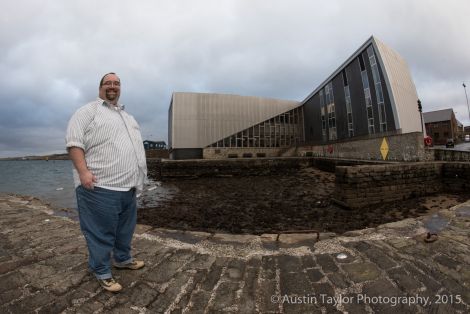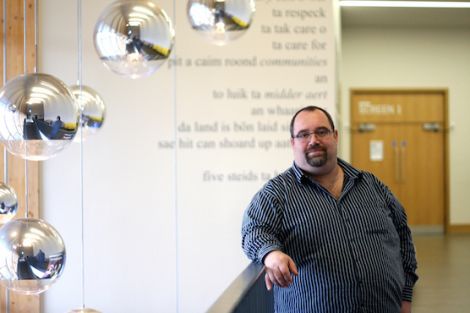News / New arts chief is up for the challenge
“I think it’s time for Shetland Arts to take a breath,” its new director Graeme Howell says as he leans back in a harbour-side office at Mareel, exhaling a cloud of blueberry and mint-flavoured steam from the vapour pipe he took up a year ago to replace smoking tobacco.
The islands’ arts agency could use a breather after an exhausting few years winning the battle to build and keep hold of the £13.5 million cinema and music venue.
Now that 43 year old Howell has replaced Gwilym Gibbons – who once complained he could not walk down Commercial Street without being confronted by an angry passer by – he wants to take time to figure out the organisation’s future.
Howell is a man of prodigious energy who enjoys thinking as far outside the box as he can get away with.
As a double bass player in Southampton his band would enjoy stretching the boundaries of music as far as possible without breaking the rules, just to confuse the soloist who was playing at the time. They called it “Australian rules jazz”.
To play like that, you need to know the rules in the first place, and since those days of “bohemian poverty” Howell has become well-versed in how to manage the creative industries.
Three months into his new job he has started to apply those rules in Shetland’s busy cultural scene, and already found himself ruffling a few feathers.
Starting at the bottom
Having failed at school due to being “severely dyslexic”, Howell made it to Southampton University thanks to British Gas, who took the school leaver on as a debt collector and gave him his first computer to complete a business and finance diploma.
“All of a sudden my work started to look neat and good and I had spell checking, so I did very well,” he said.
Become a member of Shetland News
He failed his degree in politics and economics when he couldn’t take his computer into the final exams, and ended up supporting himself as a full time musician while volunteering at the local concert hall doing menial tasks in exchange for free tickets.
Volunteering turned into a part time job, and eventually Howell was put in charge of marketing the venue, before moving to Nottingham, Norfolk and then, aged just 32, becoming business director of Bristol’s famous 2,000-seat Colston Hall in charge of a £20 million redevelopment of the iconic B-listed building.
“Doing the building project was absolutely thrilling, and by luck or judgment we managed to bring it in on time and on budget, which was my number one priority,” he said.
“A five per cent overspend is standard, but five per cent here was £1 million and would have been front page news.”
He was also made artistic director in charge of an £8 million budget, almost 90 per cent of which had to be earned through commercial operations.
Here Howell’s energy became apparent: he developed an extensive festival programme, commissioned 45 new performance works and set up a new educational arm.
His favourite projects were the more outlandish ones, like the collaboration between the Philharmonic Orchestra and “a bunch of audio/video lunatics” called I Am The Mighty Jungulator – “that was one of the crazier ones we did,” he laughs.
“I think you can be too afraid of failure and actually failure is just a step on the process of development. Until you have got it right, everything before that is failure.
“You can spend years sitting in meetings talking about doing things; I would much rather put things out there, see how people respond and learn from it.”
After seven years in Bristol he was offered a job with the privately-owned college network Access to Music. Based in Birmingham, he ran 10 campuses with 1,500 students across England and Northern Ireland.
Despite having famous students like Ed Sheeran and Rita Ora – “Dizzee Rascal never came back after his first day” – Howell took most pride in starting a course for school leavers with no qualifications.
“We had 16 year olds who were parents, who were homeless, and we got them through this qualification, because once they had that, the world opened in a way that it was very shut down before.
“If education is about anything it has to be about opening up your choices. It has to be about increasing your options and opportunities.”
Community engagement
After such a wide experience, it seems strange that Howell should want to come to such a small place as Shetland.
“I’d applied for a few jobs rather half heartedly when I saw this…and slightly didn’t twig it was in Shetland until I’d got excited about it; when I realised where it was it just made it even more interesting.”
Before applying he hopped on a train and a ferry, and found himself sitting on a cold stone step waiting for Weisdale’s Bonhoga Gallery to open on a wet and windy morning in the aftermath of last August’s hurricane.
“I went in, went downstairs to the cafe and, of course, after one of Betty’s scones I had to apply for the job,” he joked.
Shetland Arts, it turned out, was just what he was looking for – a cultural development agency covering the full cross section of the creative arts with a portfolio of buildings and a strong commitment to community engagement.
Three months after moving north, he is “not having any second thoughts, I think the potential for the organisation is huge”.
Howell has been taking stock since he started, which Shetland Arts can afford to do after securing £750,000 over three years from Creative Scotland and £690,000 from Shetland Charitable Trust for next year alone.
Other income gives the agency an annual turnover of around £2.7 million of what Howell calls “a nice mixture of earned and public money”.
His first step has been a series of consultations with staff and the public about the future. This has already aroused resistance, leading local MP Alistair Carmichael onto BBC Radio Shetland where he raised the concerns of some of the staff.
Embracing change
Howell says that he wants to see “a more robust approach” to what the organisation does.
“We have to be willing to change what needs changing; we should embrace change as the status quo as opposed to saying ‘we have done it for five years this way, so we are going to keep doing it this way’.
“It might be the right way, but it doesn’t mean it shouldn’t be challenged.”
Some of Howell’s changes have been welcomed, such as taking 70 per cent of the bar/café staff off zero hour contracts and giving them salaries.
He says these staff now feel more involved, coming up with new ideas that have already been implemented, such as a monthly open mic event and a story telling session in the Mareel café.
“The idea that there are certain people who have a monopoly on good artistic ideas I find flawed, we should be open to ideas wherever they come from,” he said.
“I like dialogue, I like conversation, I like putting ideas out there and letting people respond to them.”
Some things are already coalescing in his mind: changes to some of the festivals, staging more events outside Lerwick, meeting up with rural hall committees and making more use of Mareel’s technology.
“Shetlands Arts is about ideas and we need to become a hub for ideas, whether that’s in the café, the main auditorium, Bonhoga or anywhere.
“We should have more activity on Unst, yes, but it should be activity that’s appropriate for Unst.
“We should also be looking at how to take advantage of the broadcast abilities we have at Mareel.”
Creative communities
On the educational side, he hopes to offer students a grounding that will help them through life no matter what they end up pursuing.
“Whatever you do in the creative sector there are a core set of skills that you need, whether that’s marketing, business management, networking, or critical thinking.
“Then there are pathway specific skills you need if you want to be, say, a guitarist or a film maker.
“We would like to grow a campus approach here which streams across all the creative industries and create a really exciting environment to be a student in.
“If you need a music video for your band there’ll be a bunch of film makers you know, if you need a soundtrack for your video game there’s a bunch of musicians hanging round the corner.
“And the great thing about creating creative communities at that young age is that if one of them breaks through they will carry a few more on their coat tails, so the more we can do to create an exciting, vibrant atmosphere the better.”
He admires what he has already seen of Shetland’s cultural traditions, but sees no harm in opening up new horizons.
“Shetland has a huge array of fiddlers. That’s fantastic, but we need to take the opportunity to open them up to a whole range of other experiences and if at the end of that they still want to pursue being the world’s greatest Shetland fiddler then that’s coming from a much more robust place of choice than it being the only pathway they knew.”
hese islands are a long way from home for Howell, who misses the regular contact with his relatives, but still plays online Scrabble with his mum every Sunday.
“You shouldn’t miss places,” he says. “You miss people, but I think it’s healthy, especially for my nieces and nephews, to know that it’s OK to move away, it’s not the end of something, it’s the beginning of something else.”
And it seems that Shetland has already got something of a hold on a man who clearly likes big spaces.
“The sky here is amazing – it’s a big sky and no matter what nonsense you have to deal with, you just have to walk outside and you get properly put in your place.”
Become a member of Shetland News
Shetland News is asking its readers to consider paying for membership to get additional perks:
- Removal of third-party ads;
- Bookmark posts to read later;
- Exclusive curated weekly newsletter;
- Hide membership messages;
- Comments open for discussion.
If you appreciate what we do and feel strongly about impartial local journalism, then please become a member of Shetland News by either making a single payment, or setting up a monthly, quarterly or yearly subscription.





































































